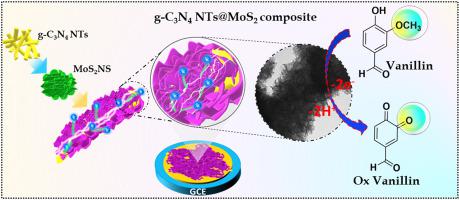Carbon ( IF 10.5 ) Pub Date : 2023-04-02 , DOI: 10.1016/j.carbon.2023.03.053 Raja Nehru , Chiu-Wen Chen , Cheng-Di Dong

|
The molybdenum disulfide (MoS2) based nanomaterials show outstanding catalytic performance in many electrochemical sensing applications with improved catalytic and electrochemical properties. Novel electrocatalyst developments and their application for food additives monitoring are of significant interest. In this work, we have developed a novel synthesis protocol for graphitic carbon nitride nanotubes decorated MoS2 composite (g-C3N4 NTs@MoS2) using the hydrothermal method and evaluated its electrochemical sensing performance towards vanillin (VN) determination. The electrochemical sensor was accomplished at various electrolytes and optimized parameters to get an enhanced current signal for VN detection. Under the optimized conditions, the sensor obtained wide linear ranges (0.005-458.9 µM), low limit of detection (LOD, 4 nM), and excellent sensitivity (3.48 μA μM−1 cm−2) using differential pulse voltammetry (DPV). Moreover, the practical applicability of the developed sensor was also successfully evaluated in food samples with an excellent recovery rate.
中文翻译:

在 g-C3N4 纳米管上原位生长 MoS2 纳米片:一种用于食品样品中香兰素测定的新型电化学传感平台
基于二硫化钼 (MoS 2 ) 的纳米材料在许多电化学传感应用中表现出出色的催化性能,具有改进的催化和电化学性能。新型电催化剂的开发及其在食品添加剂监测中的应用引起了人们的极大兴趣。在这项工作中,我们开发了一种用于石墨化碳氮化物纳米管装饰的 MoS 2复合材料(gC 3 N 4 NTs@MoS 2) 使用水热法并评估其对香兰素 (VN) 测定的电化学传感性能。电化学传感器是在各种电解质和优化参数下完成的,以获得用于 VN 检测的增强电流信号。在优化条件下,传感器使用差分脉冲伏安法 (DPV)获得了宽线性范围 (0.005-458.9 µM)、低检测限 (LOD, 4 nM) 和出色的灵敏度 (3.48 μA μM -1 cm -2 ) 。此外,所开发传感器的实际适用性也在具有出色回收率的食品样品中得到成功评估。

































 京公网安备 11010802027423号
京公网安备 11010802027423号